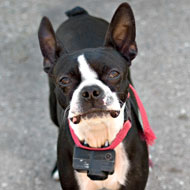
Dogs Trust meets MSPs to discuss concerns over regulations
Proposals to regulate the use of electronic training aids in Scotland may not be robust enough to protect dog welfare, the Dogs Trust has said.
The Scottish government intends to regulate the use of remote control training collars, anti-bark collars and pet containment fences, so that they can only be used under the guidance of an approved trainer or veterinary surgeon. The decision was made following a consultation in 2015.
Representatives from the Dogs Trust recently met MSPs, urging them to back their appeal for approved trainers and vets to have adequate training in animal behaviour.
The charity said it does not condone the use of equipment or techniques that use pain or fear to train dogs, and has previously called for the devices to be banned.
Head of public affairs Claire Calder said: “In the absence of an outright ban we strongly urge strict regulations be imposed to minimise the risk of misuse of such equipment. Recent research by Defra has concluded that the routine use of electronic training collars, even in accordance with ‘best-practice’ presents a risk to the well-being of pet dogs.
“We are calling on MSPs to back our appeal for approved trainers and vets to have appropriate training in animal behaviour, as set out in the Animal Behaviour Training Council’s Standard for an Animal Trainer, as we have strong concerns that the suggested Regulations will not be robust enough to protect dog welfare.
"There is currently no regulation of animal trainers in Scotland, and veterinary training includes relatively little detailed information about animal behaviour.”
MSP David Stewart said he “fully support[s]” the charity’s call for action on electronic training collars and pledged to work with them to ensure dog welfare is protected.



 The Kennel Club is inviting dog owners to attend a free webinar on gastric dilation-volvulus syndrome, also known as bloat.
The Kennel Club is inviting dog owners to attend a free webinar on gastric dilation-volvulus syndrome, also known as bloat.